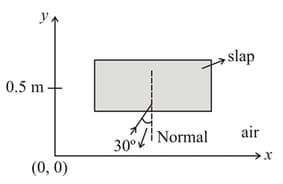Embibe Experts Solutions for Chapter: Ray Optics, Exercise 1: AP EAPCET - 3 Sep 2021 Forenoon
Embibe Experts Physics Solutions for Exercise - Embibe Experts Solutions for Chapter: Ray Optics, Exercise 1: AP EAPCET - 3 Sep 2021 Forenoon
Attempt the practice questions on Chapter 24: Ray Optics, Exercise 1: AP EAPCET - 3 Sep 2021 Forenoon with hints and solutions to strengthen your understanding. EMBIBE CHAPTER WISE PREVIOUS YEAR PAPERS FOR PHYSICS solutions are prepared by Experienced Embibe Experts.
Questions from Embibe Experts Solutions for Chapter: Ray Optics, Exercise 1: AP EAPCET - 3 Sep 2021 Forenoon with Hints & Solutions
The path of a light ray inside a transparent slab of variable refractive index is A light ray travelling in air falls on the surface of the slab at an angle as shown in the figure. The refractive index of the slab at is

A point source of light is placed at the bottom of a water lake. If the area of the illuminated circle on the surface is equal to three times the square of the depth of the lake, refractive index of water in the lake is
The principle used in the transmission of signals through an optical fibre is
The radius of curvature of the curved surface of a plano-convex lens is . If the refractive index of the material of lens is , then it will ___.
Two equiconvex lenses, each of refractive index and focal length are kept in contact with each other, and the space in between the lenses is filled with a liquid of refractive index The focal length of the combination is
A thin prism of angle made up of glass of refractive index is combined with another prism made up of glass of refractive index to produce dispersion without deviation. Then find the angle of the second prism.
An observer looks at a distant tree of height with a telescope of magnifying power of To the observer the tree appears:
